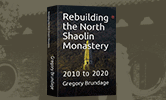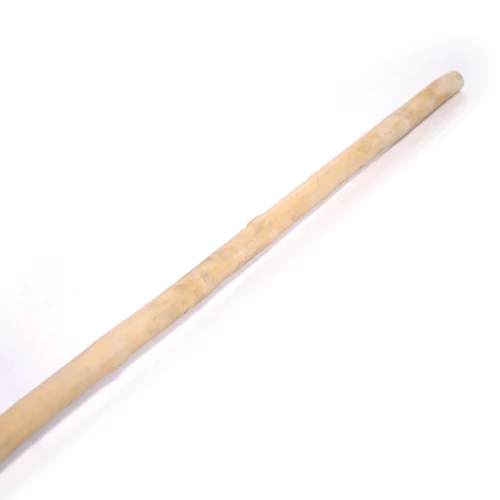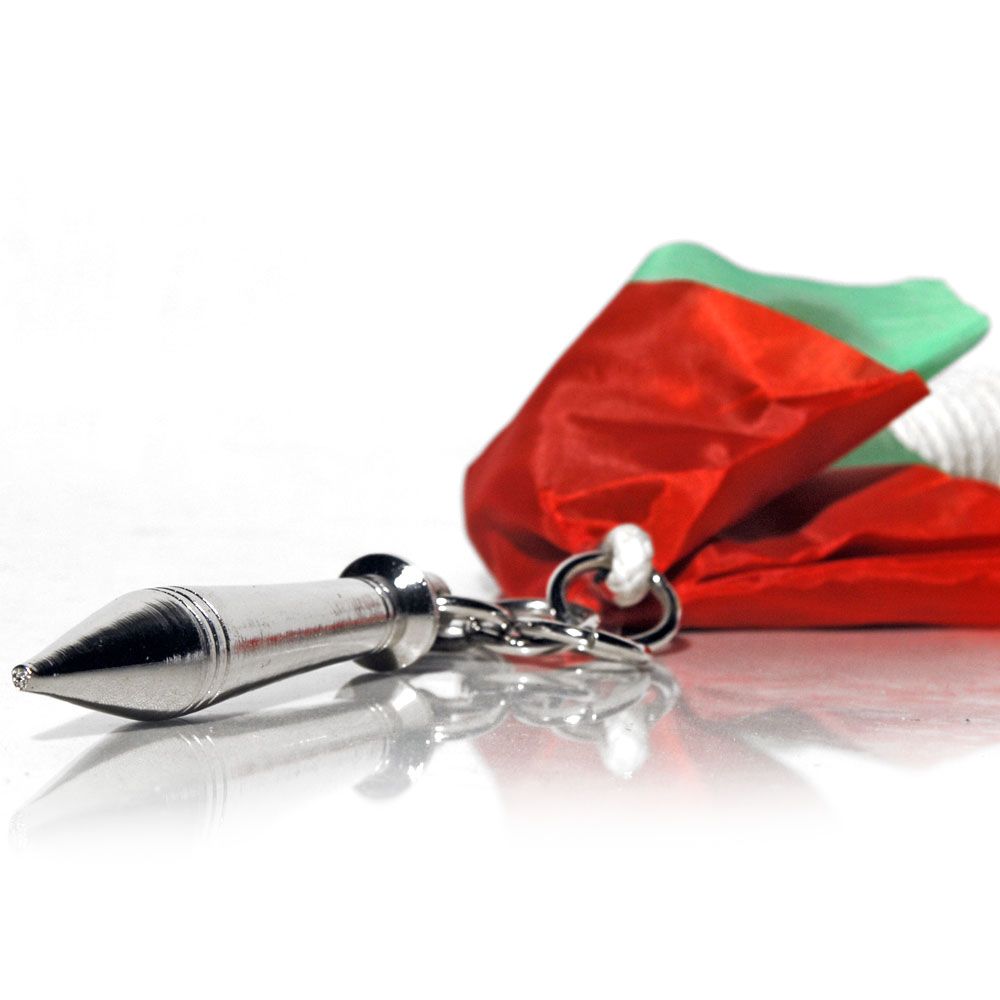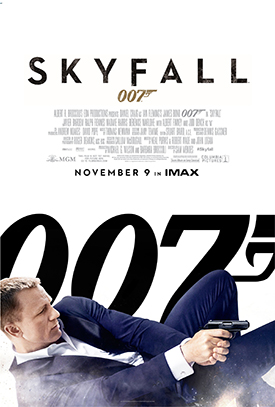 For fifty years, James Bond has been the epitome of international action, style and technology, but what few examine is the political commentary. Bond films have always played the world-political-affairs card like drawing a natural in baccarat. This spy film franchise was born during the Cold War, and Bond films present a unique perspective on western world views over the past half century. How fitting that the twenty-third installment of the Bond films continues this tradition by sending Bond to China. The last Bond film, QUANTUM OF SOLACE (2008), grossed $21 million in China, so it's a wise move for Bond's latest mission to showcase the exotic locals of Shanghai and Macao. The growing impact of China's film market has been the topic of Kung Fu Tai Chi 's ongoing column, Chollywood Rising, since 2010. This has also been a focus of several of the film reviews published here, so on the cusp of Bond's half century mark, a review of Bond's presentation of Asia and Asians is in order.
For fifty years, James Bond has been the epitome of international action, style and technology, but what few examine is the political commentary. Bond films have always played the world-political-affairs card like drawing a natural in baccarat. This spy film franchise was born during the Cold War, and Bond films present a unique perspective on western world views over the past half century. How fitting that the twenty-third installment of the Bond films continues this tradition by sending Bond to China. The last Bond film, QUANTUM OF SOLACE (2008), grossed $21 million in China, so it's a wise move for Bond's latest mission to showcase the exotic locals of Shanghai and Macao. The growing impact of China's film market has been the topic of Kung Fu Tai Chi 's ongoing column, Chollywood Rising, since 2010. This has also been a focus of several of the film reviews published here, so on the cusp of Bond's half century mark, a review of Bond's presentation of Asia and Asians is in order.
James Bond, as we know it, is the flagship franchise of Eon Productions, headed by the Broccoli family whose ancestors helped popularize the vegetable of the same name. Albert "Cubby" Broccoli was succeeded by his daughter, Barbara Broccoli, in 1995, and she has continued co-producing the franchise, including this latest installment, SKYFALL. There have been a few non-Eon Bond films, including an early hard-to-find 1954 television production of CASINO ROYALE, a 1967 parody version of CASINO ROYALE that starred Woody Allen and Peter Sellers, and NEVER SAY NEVER AGAIN (1983) with Sean Connery reprising the iconic role for the last time. In truth, Bond is turning 60, as author Ian Fleming first began writing Casino Royale in 1952. But the Eon films took on a life of their own, solidifying Bond's reputation as the globe-trotting superhero spy.
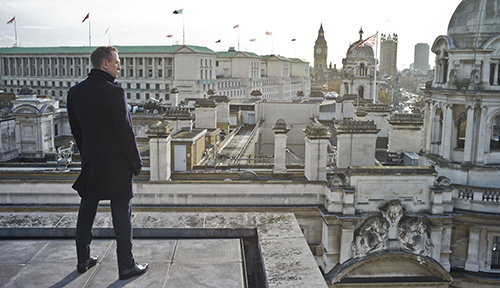
The early Bond films cast Asians as villains but also made great advances for the introduction of martial arts to western culture. The first Eon-produced James Bond film featured a half-Chinese villain. DR. NO (1962) was a Chinese-German agent of SPECTRE, a clear derivation of the preceding stereotypical Asian menace, Fu Manchu. The portrayal of Dr. No, achieved with slant-eye makeup, would be the role for which actor Joseph Wiseman would be most remembered. The third Bond film, GOLDFINGER (1964), introduced another Asian villain, one of Bond's greatest nemeses. Oddjob was Goldfinger's manservant, a Korean assassin with a deadly hat, played by Harold Sakata, a Japanese-American Olympic weightlifter and professional wrestler. Through Oddjob and following similar roles, Sakata helped introduce the notion of the Karate chop to the American public. As a side note, GOLDFINGER Bond girl Honor Blackman, who played Pussy Galore, was an avid practitioner of judo. Who can forget Bond and Pussy's judo-throwing foreplay before their "roll in the hay" in a barn? The year after GOLDFINGER premiered, she went on to publish one of the very first martial arts books directed towards women, Honor Blackman's Book of Self-Defense (although arguably it was eye-candy for male readers too).
The fifth Bond film, YOU ONLY LIVE TWICE (1967), was truly groundbreaking for the franchise and the portrayal of Asia and the martial arts. Unlike the previous four films, YOU ONLY LIVE TWICE diverged significantly from Fleming's book of the same name. The book was about Bond finally avenging his wife's murder by his arch nemesis Blofeld in his Japanese "Garden of Death." The film only took the title. The screenplay was totally written by Roald Dahl, the noted author of children's books including Charlie and the Chocolate Factory and James and the Giant Peach (if that seems odd, note that Fleming's most famous other work was Chitty Chitty Bang Bang, also adapted for screen by Dahl, produced by Cubby Broccoli, and featured Gert Fröbe (Goldfinger) as the villain. What's more, Chitty was supplied by Desmond Llewelyn, who played Q from 1963 to 1999). YOU ONLY LIVE TWICE began in Hong Kong, which, though still under Her Majesty's jurisdiction, could be seen as Bond's first step into what once was China (and would return to her three decades later). More notably, YOU ONLY LIVE TWICE was one of the first Western films to showcase Japanese martial arts like Sumo and Kendo. Most significantly, it introduced Western audiences to ninjas.
Bond returned to Hong Kong and added a side trip to Macau in THE MAN WITH THE GOLDEN GUN (1974). For years following, the Bottoms Up Club in Hong Kong boasted being featured in the film as an intrinsic part of its advertising. Both locations were depicted as colorful and exotic, albeit a little seedy. It was in TOMORROW NEVER DIES (1997 - the same year Britain returned Hong Kong to China) that Bond made major headway into British Chinese relations. This was the debut of Chinese super spy, Wai Lin, played by none other than Michelle Yeoh. It was a revolution for Bond girls. Wai Lin not only kept up with Bond, she bested him in the fight scenes (Michelle Yeoh versus Pierce Brosnan? Seriously?) so much so that when Wai Lin finally succumbs to Bond's kiss with that classic "Oh James!" line, it seems as off the mark as a Bond villain's machine gun fire. Brosnan's final portrayal of Bond in DIE ANOTHER DAY (2002) had Rick Yune, Will Yun Lee and Kenneth Tsang cast as North Korean villains. Even though that was a decade ago, if there's a new Cold War to be launched by Hollywood, North Korea is the prime target. The upcoming remake of RED DAWN was reformatted to vilify North Korea instead of China. Even though China would be the most populous "red menace," Hollywood does millions of dollars of business with China and not one red cent with North Korea.
This brings Bond back to SKYFALL. When Daniel Craig assumed the role of 007 in CASINO ROYALE (2006), it was a complete reboot of the series. The only carry-over was Judi Dench's portrayal of M, a role she has held since 1995. CASINO ROYALE gave the Bond franchise a much-needed bump with Craig's gritty characterization of Bond, which feels truer to Fleming's original novels. The opening, with a death-defying stunt by Parkour founder Sebastien Foucan, made clear that Bond was back. Craig's second outing as 007, in QUANTUM OF SOLACE (2008), suffered from a weak story as it was made during a writers' strike (the script was only partially complete). SKYFALL also had its production issues as MGM went bankrupt during filming. Nevertheless, SKYFALL intrepidly continues to rebuild the franchise. It reestablishes mainstay supporting characters and Bond's signature tools of his trade, all while giving nods to the legacy of the franchise. SKYFALL is still sparing in its use of the James Bond theme music, reserving it for the most Bond-age filled moments in the film, but Adele's soulful title track harkens to the timeless work of Shirley Bassey.
And China will surely be pleased with the results. Animated Chinese dragons adorn Adele's opening credits, done in that classic Bond style. Shanghai's neon-lit cityscape serves as a glittering backdrop, a fitting tribute to this magnificent modern metropolis in all her spectacular glory. The floating casino in Macao is also stunningly shot, honoring the exotic Asiatic flair without descending into stereotype. The Asian villains aren't derogatory, and they are mixed in with a gang of varied ethnicities. Early in production, Tang Wei and Shu Qi were tossed about as potential new Bond girls, and, given the setting, either would have been totally appropriate for the role, as well as very appealing to the China film market. However, in the end, both lost out to Bérénice Marlohe, which is just as well, as she winds up being a rather lackluster Bond girl as Bond girls go. She's gorgeous, but she's no Honor Blackman or Michelle Yeoh.
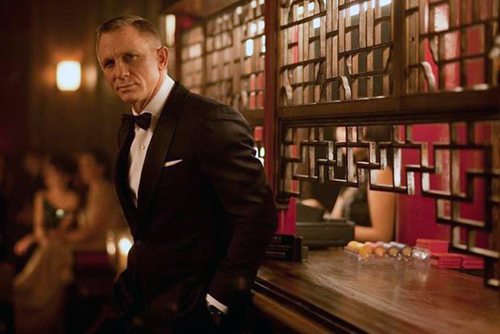
At 143 minutes, SKYFALL is a little longer than it needs to be. It could have used some judicious editing to keep up the pace. The opening chase scene is a great thrill ride, with echoes of Jackie Chan and Michelle Yeoh's train-top finale in SUPERCOP (1992). SKYFALL takes note of the IT surveillance trend that has taken over today's spy films (the new Q played by Ben Whishaw is a stereotypical IT nerd). Bond is branded as "old school," which is totally appropriate and works as a sufficient plot device. SKYFALL is a fitting installment for fifty years of Bond, recalling the past while forging ahead. Craig is signed on for the next two Bond films, which he'll juggle with his commitment to THE GIRL WITH THE DRAGON TATTOO franchise. But for now, Craig's reboot is a license to kill renewed, and the next installment looks very promising.
About
Gene Ching :
![]() SKYFALL opens on November 9, 2012. Click 007.com or skyfall-movie.com for additional information.
SKYFALL opens on November 9, 2012. Click 007.com or skyfall-movie.com for additional information.
![]() Print Friendly Version of This Article
Print Friendly Version of This Article








